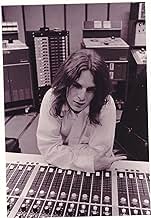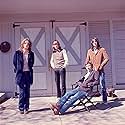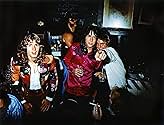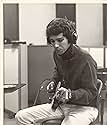CALIFICACIÓN DE IMDb
7.1/10
1.5 k
TU CALIFICACIÓN
Agrega una trama en tu idiomaBig Star: Nothing Can Hurt Me is a feature-length documentary film about the dismal commercial failure, subsequent massive critical acclaim, and enduring legacy of pop music's greatest cult ... Leer todoBig Star: Nothing Can Hurt Me is a feature-length documentary film about the dismal commercial failure, subsequent massive critical acclaim, and enduring legacy of pop music's greatest cult phenomenon, Big Star.Big Star: Nothing Can Hurt Me is a feature-length documentary film about the dismal commercial failure, subsequent massive critical acclaim, and enduring legacy of pop music's greatest cult phenomenon, Big Star.
Lester Bangs
- Self
- (material de archivo)
Chris Bell
- Self
- (material de archivo)
The Box Tops
- Themselves
- (material de archivo)
Panther Burns
- Themselves
- (material de archivo)
Alex Chilton
- Self
- (material de archivo)
Steve Cohen
- Self - U.S. Congressman
- (material de archivo)
The Cramps
- Themselves
- (material de archivo)
- Dirección
- Guionista
- Todo el elenco y el equipo
- Producción, taquilla y más en IMDbPro
Opiniones destacadas
I went into the theater expecting a rock-n-roll documentary about a group I'd never heard of. I agree with many of the reviewers here that the film starts slowly and appears to want to convince me that this extraordinary ensemble just didn't get the break they needed. The point was pounded home time and again but, not being an big fan of rock-n-roll I felt the need of more evidence, until the story began to break about the individuals in the band and the emotional content of their work together and their lives. It was as if they all--with the exception of Chris Bell--assumed they'd get what they deserved, and too bad if that was less than it might be. Here is where the story begins to become intriguing, but the payoff is not complete.
I am the same age as the Beatles, roughly, and bought their albums and the mythology that went along with them. I admit I didn't know much more about rock-n-roll than that. If you'd ask me what the band who produced "The Letter" was I would probably have said The Monkees. In fact, the lead singer on that number was Alex Chilton, who became the central member of Big Star.
In the q-and-a after the showing of BIG STAR, the director revealed that much of the angst endured by Chris Bell had to do with homosexuality, and there is an area of silence around this facet his life when you are interviewing his family and remaining friends. The nugget of information would be crucial to the narrative of the band and explain to a degree why the film didn't fully work for me. I could tell Bell was difficult, tormented, and probably a genius--but what his demons were, and what his relationship with Chilton was, was not even hinted at. He seemed petulant and jealous that Chilton became the star of the group, but the level of disillusion, betrayal and pain didn't seem to come from anywhere.
The film made me think; it informed me of much I didn't know about the Memphis scene and rock-n-roll in the 70s, when I was off into folk and then into old-time pop music and jazz. I parted company with the mainstream but not to the degree Big Time did. Nevertheless it is interesting to learn about their path. Now that I know there is a great deal more to their story, I would love to hear that as well.
I am the same age as the Beatles, roughly, and bought their albums and the mythology that went along with them. I admit I didn't know much more about rock-n-roll than that. If you'd ask me what the band who produced "The Letter" was I would probably have said The Monkees. In fact, the lead singer on that number was Alex Chilton, who became the central member of Big Star.
In the q-and-a after the showing of BIG STAR, the director revealed that much of the angst endured by Chris Bell had to do with homosexuality, and there is an area of silence around this facet his life when you are interviewing his family and remaining friends. The nugget of information would be crucial to the narrative of the band and explain to a degree why the film didn't fully work for me. I could tell Bell was difficult, tormented, and probably a genius--but what his demons were, and what his relationship with Chilton was, was not even hinted at. He seemed petulant and jealous that Chilton became the star of the group, but the level of disillusion, betrayal and pain didn't seem to come from anywhere.
The film made me think; it informed me of much I didn't know about the Memphis scene and rock-n-roll in the 70s, when I was off into folk and then into old-time pop music and jazz. I parted company with the mainstream but not to the degree Big Time did. Nevertheless it is interesting to learn about their path. Now that I know there is a great deal more to their story, I would love to hear that as well.
Greetings again from the darkness. The best filmmakers can be described as visual storytellers. However, what can we expect from a film if the story has no real climax or even a definitive ending? Well if the story is early 70's band Big Star and if the filmmakers are co-directors Drew DeNicola and Olivia Mori, and Producer Danielle McCarthy, the answer is an incredibly interesting and enthralling tale of how sometimes the universe just doesn't line up the way it should.
Mythical stories involve such things as unicorns and the lost city of Atlantis. It's tempting, though incorrect, to label Big Star as the mythical great band of the 1970's. In fact, they were all too real. For the past 40 years, their influence has worked its way through the musical world and is obvious in the works of such bands as R.E.M. and The Replacements ... just as the influence of The Beatles, The Byrds, The Kinks and more can be heard in the songs of Big Star. The mystery and confounding question is why did the beautiful music of Big Star never "make it" to the big time like those others?
This documentary is a technical and structural and visual and auditory marvel. It captures and holds our attention just like any other well made historical drama would. A doc on The Rolling Stones or Bruce Springsteen would revel in the big time success achieved or the legendary live performances or recording sessions. Instead, with Big Star, we get a much more personal look at the creative genius of its two leaders: Chris Bell and Alex Chilton. They are described as flashing comets passing in the sky. Their all too brief time together produced something special that, still to this day, deserves to be heard. Their tragic personal stories need to be told. This film does both things very well. A large part of the Big Star catalog is heard throughout, and the abundance of meaningful interviews paints a clear picture of the band and its members.
One would be challenged to name any artist or creative endeavor that has been more critically acclaimed, yet commercially unsuccessful as Big Star. It absolutely makes no sense ... except for the cursory explanation given to the record labels: Ardent Records and Stax Records, and their ultimate failure in gaining retail distribution and radio airtime. Could it really be as simple as horrendous business execution? At this point, none of it really matters. The real interest ... the real story ... is the personal insight provided by lone surviving band member Jody Stephens, record producers John Fry (Ardent founder) and Jim Dickinson, and of course, the brother and sister of Chris Bell.
If you are asking yourself why you have never heard any music by a band that occupies 3 slots in Roling Stones' 500 Greatest Albums of all time, I encourage you to seek out the songs ... or pay attention the next time you are watching the opening of "That 70's Show". Yes, that is Cheap Trick doing a cover of a Big Star song. There is much to be gained from seeing this documentary and discovering Big Star ... even all these years later.
Mythical stories involve such things as unicorns and the lost city of Atlantis. It's tempting, though incorrect, to label Big Star as the mythical great band of the 1970's. In fact, they were all too real. For the past 40 years, their influence has worked its way through the musical world and is obvious in the works of such bands as R.E.M. and The Replacements ... just as the influence of The Beatles, The Byrds, The Kinks and more can be heard in the songs of Big Star. The mystery and confounding question is why did the beautiful music of Big Star never "make it" to the big time like those others?
This documentary is a technical and structural and visual and auditory marvel. It captures and holds our attention just like any other well made historical drama would. A doc on The Rolling Stones or Bruce Springsteen would revel in the big time success achieved or the legendary live performances or recording sessions. Instead, with Big Star, we get a much more personal look at the creative genius of its two leaders: Chris Bell and Alex Chilton. They are described as flashing comets passing in the sky. Their all too brief time together produced something special that, still to this day, deserves to be heard. Their tragic personal stories need to be told. This film does both things very well. A large part of the Big Star catalog is heard throughout, and the abundance of meaningful interviews paints a clear picture of the band and its members.
One would be challenged to name any artist or creative endeavor that has been more critically acclaimed, yet commercially unsuccessful as Big Star. It absolutely makes no sense ... except for the cursory explanation given to the record labels: Ardent Records and Stax Records, and their ultimate failure in gaining retail distribution and radio airtime. Could it really be as simple as horrendous business execution? At this point, none of it really matters. The real interest ... the real story ... is the personal insight provided by lone surviving band member Jody Stephens, record producers John Fry (Ardent founder) and Jim Dickinson, and of course, the brother and sister of Chris Bell.
If you are asking yourself why you have never heard any music by a band that occupies 3 slots in Roling Stones' 500 Greatest Albums of all time, I encourage you to seek out the songs ... or pay attention the next time you are watching the opening of "That 70's Show". Yes, that is Cheap Trick doing a cover of a Big Star song. There is much to be gained from seeing this documentary and discovering Big Star ... even all these years later.
Big Star fans will undoubtedly eat this up, and those unfamiliar with the band absolutely should watch it as well. Lots of fantastic interviews with people who were heavily involved with the production of their records, and I am also grateful for a healthy dose of information on Chris Bell (which seems incredibly hard to come by, even in this age). After watching the film I had a hard time figuring out if this film preaches to the converted, or actually makes an attempt to introduce the uninitiated to this incredible band. I thought I knew quite about the band prior to watching this, but after watching this I realize how little I really knew.
Really bored this evening and decided to watch this documentary which turned out to be both tragic, and heartwarming....bittersweet. It was just heartbreaking to see their journey, with big dreams and great material, turn into their broken dreams which would later inspire thousands of fans and dozens of musical acts. Really beautifully done.
As a voracious consumer of "Rock Docs," this one left me flat. The story is told in such a way that it is nearly impossible to follow (unless you are a Memphis super fan, I guess). It ambled along following every little thread until I just didn't care anymore.
As with "Mr. Blue Sky" (the Geoff Lynne doc), the superlatives flow like water. After a while, they just become meaningless.
And most important of all, I didn't leave this film and rush straight to ITUNES to download their work. If the music is as good as the interviewees bleated on about; they were not able to convey it within the film itself.
As with "Mr. Blue Sky" (the Geoff Lynne doc), the superlatives flow like water. After a while, they just become meaningless.
And most important of all, I didn't leave this film and rush straight to ITUNES to download their work. If the music is as good as the interviewees bleated on about; they were not able to convey it within the film itself.
¿Sabías que…?
- ErroresWhen listing current artists that were influenced by Big Star, Elliott Smith is seen introducing a Big Star cover song on the Jon Brion Show with the date 1996. The show was not recorded until 2000.
Selecciones populares
Inicia sesión para calificar y agrega a la lista de videos para obtener recomendaciones personalizadas
Everything New on HBO Max in July
Everything New on HBO Max in July
Looking for something different to add to your Watchlist? Take a peek at what movies and TV shows are coming to HBO Max this month.
Detalles
- Fecha de lanzamiento
- País de origen
- Sitios oficiales
- Idioma
- También se conoce como
- Большая звезда: Ничто не может причинить мне боль
- Locaciones de filmación
- Productoras
- Ver más créditos de la compañía en IMDbPro
Taquilla
- Total en EE. UU. y Canadá
- USD 105,998
- Fin de semana de estreno en EE. UU. y Canadá
- USD 15,096
- 7 jul 2013
- Total a nivel mundial
- USD 105,998
- Tiempo de ejecución1 hora 53 minutos
- Color
- Relación de aspecto
- 1.78 : 1
Contribuir a esta página
Sugiere una edición o agrega el contenido que falta

Principales brechas de datos
By what name was Big Star: Nothing Can Hurt Me (2012) officially released in Canada in English?
Responda




























